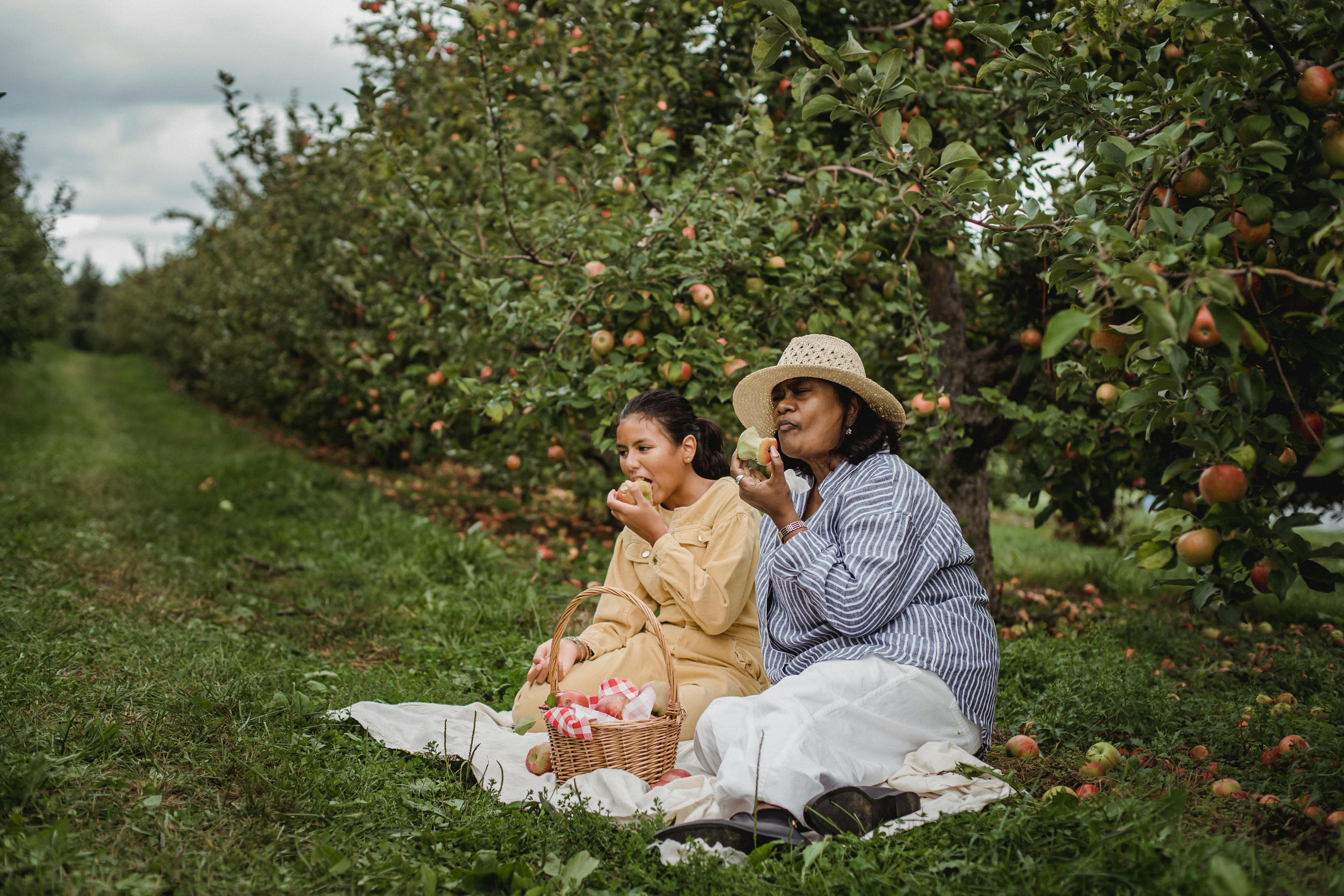Squirrels can be a nuisance when it comes to eating from your fruit trees. Not only do they take away the produce, but they can cause considerable damage to the tree itself. Fortunately, there are several steps you can take to discourage squirrels from eating your fruit trees and protecting your beloved trees. In this article, you will learn some tips and tricks on how to stop squirrels from eating fruit trees.To prevent squirrels from eating fruit trees, there are a few steps that can be taken. First, trim back any overhanging branches to reduce access to the tree. Secondly, wrap the trunk of the tree with a metal fencing or wire mesh so that the squirrels cannot climb it. Thirdly, install a motion-activated sprinkler system around the tree that will activate when the squirrels come near it and scare them away. Lastly, place baffles (cone-shaped guards) around the trunk of the tree or hang them from branches to make it more difficult for squirrels to climb up to get at fruit and nuts.
Tips for Keeping Squirrels Away From Fruit Trees
Protecting fruit trees from squirrels can be a challenge, but it is possible with the right methods. One of the best ways to keep squirrels away from fruit trees is to make the area around the tree less appealing to them. Trim back any nearby trees and shrubs that provide cover or access to the fruit tree. Additionally, prune lower-hanging branches so that squirrels cannot climb up the tree easily. Set up a fence around the base of the tree, making sure that it extends at least two feet above ground level. This will prevent squirrels from digging under and accessing the tree.
Another option is to use repellents such as strong-smelling substances, like garlic or pepper spray, or loud noises, such as alarms or motion-activated devices, to scare away squirrels. These methods can be effective in keeping away small numbers of squirrels, but may not be as successful at preventing larger infestations of these pests.
It’s also important to make sure that any food sources are eliminated around your fruit trees. Be sure to remove fallen fruits and nuts from below your trees and pick up any birdseed or pet food that may be on your property. If you have bird feeders near your fruit trees, try relocating them farther away or removing them completely.
Finally, trapping and relocating squirrels can be an effective way to reduce their presence in your yard. Make sure to set traps in areas where you’ve seen signs of activity and check them regularly so that caught animals do not suffer unnecessarily. You should also contact a licensed wildlife professional if you need help controlling a large infestation of squirrels on your property.
By following these tips for keeping squirrels away from fruit trees, you can protect your precious harvest and enjoy delicious fruits throughout the season!
How to Deter Squirrels From Eating Fruit Trees
Squirrels can be a major nuisance when it comes to the health and production of your fruit trees. They not only consume the fruits but also chew on the bark, damage leaves and flowers, and strip an entire tree of its nuts. Fortunately, there are a few steps you can take to deter squirrels from eating your fruit trees.
The first step is to make sure that your fruit trees are securely enclosed by a fence or other barrier. This will help prevent squirrels from getting into the tree’s branches. It is also important to keep the area around the tree free of debris so that squirrels don’t have a place to hide or nest.
Another way to discourage squirrels from eating your fruit trees is to trap them in live traps or use repellents such as sprays or granules. Live traps allow you to capture the squirrels without harming them so that they can be released in an appropriate location away from your property. Repellents are available in both liquid and granular form and contain ingredients such as capsaicin, which provide a smell and taste that squirrels find unpleasant.
You can also make physical barriers around your fruit trees by pruning branches away from objects that could provide access for squirrels, such as power lines or trees with low hanging branches. Wrapping chicken wire around the trunk of the tree is also an effective deterrent, as it makes climbing difficult for the rodents. Additionally, you should keep your yard free of food sources which could attract them, such as bird seed and pet food, as this will reduce their presence in general.
Finally, if all else fails you may need to consider using chemical repellents around your fruit trees. These products contain ingredients such as naphthalene or thiram which give off unpleasant odors that drive away pests like squirrels. However, chemical repellents should only be used as a last resort since they can be toxic if misused or over-applied.
By taking these steps you should be able to effectively deter squirrels from eating your fruit trees and protect them from damage caused by these pests.
Creating a Physical Barrier Around Fruit Trees
Creating a physical barrier around fruit trees is a great way to protect them from pests and other animals that may try to reach the tasty fruits. The most effective way to do this is by fencing off the area around the tree. This can be done with either a wire mesh fence or even an electric fence, depending on the level of protection required. For a more permanent solution, stone or brick walls can be used to create a complete barrier around the tree. It is important to ensure that the fence or wall is tall enough and sturdy enough to keep out any unwanted visitors. Additionally, it is important to check for any weak spots where animals can enter and make sure they are covered up.
Another option for creating a physical barrier around fruit trees is to use plants as part of the barrier. Planting dense shrubs and other plants around the base of the tree can provide an additional layer of protection against pests and animals. Additionally, these plants will also provide shade for the tree during hot summer months, helping it stay healthy and productive for longer periods of time. It is important to research which types of plants will be best suited for this purpose in order to ensure they are able to thrive in your climate and provide adequate protection from pests and animals.
Finally, another option for creating a physical barrier around fruit trees is to use netting or bird netting. This type of netting can be placed over the entire tree or just over certain parts of it in order to keep birds away from its fruits. It is important to make sure that the netting is tightly secured so that birds are not able to get inside it and reach your fruits. Additionally, it should be checked regularly for any signs of damage or wear so that it remains effective in protecting your fruit trees from unwanted visitors.
Setting Up Effective Barriers Around Fruit Trees
Setting up barriers around fruit trees is an important step in protecting the trees from pests and animals. These barriers can be made out of a variety of materials, such as netting, fencing, or even specialized plastic tree guards. There are also a number of chemicals available that can be used to control pests and keep animals away from the trees. When setting up these barriers, it is important to make sure that they are properly installed and maintained so that they are effective in protecting your fruit trees.
The first step in setting up effective barriers around your fruit trees is to choose the right materials for the job. If you are using netting or fencing, you will want to make sure that it is strong enough to withstand weather conditions and keep animals out. You should also consider if the material will work well with whatever type of pest control chemicals you plan on using. If you decide to use plastic tree guards, make sure they fit your tree properly and securely so that they are able to protect it from any unwanted pests or creatures.
Once you have chosen the right materials for your barrier, it is important that you install them correctly. Netting or fencing should be installed at least two feet away from the trunk of the tree so that it does not interfere with its growth. If using plastic tree guards, make sure they are securely fastened around the trunk of the tree so that they do not come off easily in windy conditions or if animals try to push them off.
Finally, it’s important to maintain your barriers throughout the year by regularly checking for signs of damage or wear and tear caused by weather conditions or animal activity. Make sure any damaged areas get fixed immediately so that your barrier remains effective in protecting your fruit tree from unwanted visitors. With proper installation and maintenance of barriers around fruit trees, you can ensure that your harvest remains safe from pests and animals each season!

Repellents to Discourage Squirrels from Eating Fruit Trees
Squirrels can be a nuisance for fruit tree owners, as they can eat the fruit before it has a chance to ripen. While fencing or other physical barriers can help keep squirrels away from fruit trees, using repellents is also an effective solution. Repellents are substances designed to deter animals from entering a particular area. There are several types of repellents available for discouraging squirrels from eating fruit trees, including taste repellents, scent repellents and visual deterrents.
Taste repellents are typically applied directly to the fruit and leaves of the tree. These products contain ingredients that make the fruit and leaves unappealing to squirrels, such as hot pepper flakes or capsaicin-based sprays. Scent repellents use strong-smelling substances such as garlic or predator urine that discourage squirrels from coming near the tree. Visual deterrents are devices such as reflective tapes or spinning windmills that scare off the animals when they approach the tree.
Using a combination of these repellent methods is often more effective than relying on just one type of deterrent. Repellents should be applied regularly in order to be most effective, and may need to be reapplied after heavy rainfalls or strong winds. Additionally, it may also be necessary to use additional physical barriers such as fences in order to keep persistent squirrels away from the tree. With a bit of patience and persistence, it is possible to protect fruit trees from pesky squirrels using repellent methods.
Apply Natural Repellents to Discourage Squirrels
Squirrels can be a nuisance when they invade your home or garden, but you don’t have to resort to chemicals or traps to get rid of them. Instead, there are a number of natural repellents that you can use to discourage squirrels from invading your property.
First, try using a mixture of cayenne pepper and water, which can be sprayed in areas where squirrels have been seen. The cayenne pepper will irritate their noses and make the area unappealing for them. You can also use garlic or onion powder spread around the perimeter of garden beds or other areas where squirrels may be present.
You can also create a homemade mixture of two parts water and one part white vinegar and spray it in areas where squirrels tend to frequent. The smell of the vinegar will repel them and make it less likely that they’ll return. Alternatively, you could fill a spray bottle with water and dish soap and spray it in problem areas; its unpleasant smell will keep them away.
Finally, try planting certain plants that are known to naturally repel squirrels such as lavender, eucalyptus, rosemary, mint, and marigolds. These plants will give off smells that squirrels don’t like so they’ll stay away from the area instead of invading your space.
Overall, natural repellents are an effective way to discourage squirrels from entering your home or garden without having to resort to harsh chemicals or traps. By using cayenne pepper mixtures, garlic or onion powder, white vinegar mixtures, dish soap mixtures or certain types of plants you should be able to successfully keep squirrels away from your property.
Utilize Taste Repellents to Keep Squirrels Away From Fruit Trees
Squirrels can be a nuisance for gardeners, especially when they start to feast on the fruits of their labor. Fortunately, there are ways to keep squirrels away from fruit trees. One of the most effective methods is to use taste repellents. Taste repellents are substances that have an unpleasant taste that will deter squirrels from eating the fruits of your trees.
Taste repellents come in a variety of forms, including sprays and granules. Sprays can be applied directly onto the fruit or bark of the tree, while granules can be sprinkled around the base of the tree or over the entire area where squirrels may be accessing the tree.
When using taste repellents, it is important to note that they should not be used on trees that have already been damaged by squirrels as they may not work as effectively in this situation. Additionally, taste repellents should only be used as a last resort after other methods have failed. It is important to remember that while taste repellents are effective at keeping squirrels away from your fruit trees, they can also be harmful to other animals if ingested so it is important to use them responsibly and follow all label instructions carefully.
Taste repellents work best when applied consistently over a period of several weeks or months in order for them to become effective. Additionally, it is important to reapply them regularly as their effectiveness can wane over time due to rain and other environmental factors. By utilizing taste repellents and following all label instructions carefully, you can effectively keep squirrels away from your fruit trees and enjoy a bountiful harvest!

Conclusion
The best way to stop squirrels from eating fruit trees is to make sure the area around your tree is squirrel-proof. Use repellents, garden netting, and other deterrents to keep them away. You can also try planting flowers or shrubs that are not attractive to squirrels. Finally, you can try trapping and relocating the animals if nothing else works.
It is important to note that squirrels are wild animals and should be treated humanely. It is also important to look into local laws before taking any action to ensure you are following all regulations for wildlife control in your area.
By following these steps, you will be able to protect your fruit trees from hungry squirrels and enjoy a bountiful harvest for years to come.



